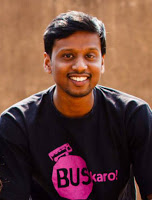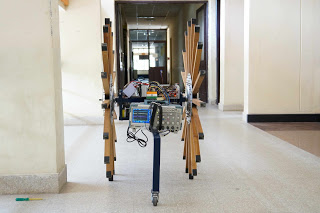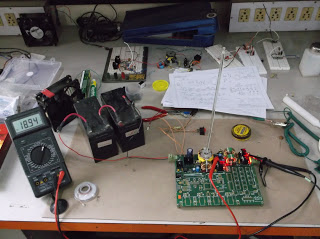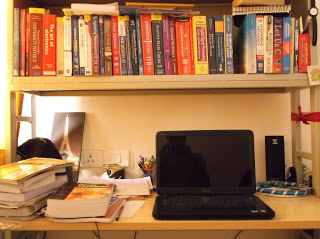I am Lalit Patnaik and This is How I Work
 Today, I am interviewing Lalit Patnaik in the “How I Work” series. Lalit hails from Bhubaneswar, the ‘Temple city of India’, in the eastern state of Odisha. After completing his Bachelor of Technology in Electrical Engineering from National Institute of Technology, Rourkela, he has been in Bangalore for close to a decade now, where he worked in industry, got a masters and then a PhD. Apart from science and engineering, he loves sports and music. He used to play for the institute cricket team, and managed to do a couple of amateur song recordings.
Today, I am interviewing Lalit Patnaik in the “How I Work” series. Lalit hails from Bhubaneswar, the ‘Temple city of India’, in the eastern state of Odisha. After completing his Bachelor of Technology in Electrical Engineering from National Institute of Technology, Rourkela, he has been in Bangalore for close to a decade now, where he worked in industry, got a masters and then a PhD. Apart from science and engineering, he loves sports and music. He used to play for the institute cricket team, and managed to do a couple of amateur song recordings.
Current Job: Project Associate, Power Electronics Lab: Dept. of Electronic Systems Engg at the Indian Institute of Science, Bangalore
Current Location: Bangalore, India
Current mobile device: Samsung Galaxy S3 Mini
Current computer: Dell Inspiron with Intel Core i5, OS: Linux Mint Debian Edition
Can you briefly explain your current situation and research to us?
Last April I completed my PhD in Power Electronics lab at the Department of Electronic Systems Engineering, Indian Institute of Science, Bangalore. I’ve been working as a Project Associate in the same lab since then. Starting Jan 2016 I’ll be joining a postdoctoral research position either in Canada or USA (yet to be decided!). Few years down the line, I plan to take up a full time faculty position in academia devoting equal time to teaching and research.
My PhD research was on the energetics and dynamics of legged locomotion. I designed and built a mobile robot using what are called rimless wheels – imagine a wheel with sturdy spokes and the rim removed. It forms an interesting category between wheeled and legged systems. The robot was driven by brushless dc motors and I developed a special controller and electric drive for the application. I also did some theoretical work on modeling the dynamics of walking systems. Looking ahead, I plan to work on improving electric drives in various mechatronic applications including (but not limited to) electric cars. Inter-discipinary work excites me because all real world systems involve multiple domains of expertise.
What tools, apps and software are essential to your workflow?
Simulation: MATLAB/Octave for scripts and number crunching, LTSpice/ngspice for circuit simulations
Computer Aided Design: gEDA toolsuite for Printed Circuit Board design, AutoCAD for mechanical design, Verilog/VHDL for digital hardware description.
Microcontroller programming: C, assembly
Documentation: Latex/Beamer and LibreOffice for text, Inkscape and GIMP for graphics/images.
Git for version management of all software codes.
Freeplane for mind-mapping of ideas – especially useful for thesis writing.
JabRef for reference management.
I sincerely appreciate the FOSS (free and open source software) community for creating and supporting the free software tools that I used. The leap from Windows to Linux has been liberating.
What does your workspace setup look like?
I alternate between home office and lab. I do most of my reading and writing in the silence and solitude of my room, while the simulation and experiments are done in the lab. Another important component of the lab is the healthy discussions with lab mates on each others work. Picture of both my workspaces as well as my experimental set-up are given here:
 |
| Experimental setup |
 |
| Lab bench |
 |
| Room for working |
What is your best advice for productive academic work?
1) Fight procrastination: Start with what you have. Don’t wait for the conditions to be perfect. They never will.
2) Get into the habit of writing down *everything*. Maintain a research journal.
How do you keep an overview of projects and tasks?
I’m a big fan of to do lists. I maintain mega and mini to do lists for all tasks and immediate tasks respectively, and I sort them by categories. Although I’ve tried apps like ‘Getting Things Gnome’ and ‘Any.do’, I feel paper and pen are still the best. The unprinted sides of bills, receipts and tickets are ideal for jotting diurnal to do lists, and this helps upcycle all those bits of paper.
Besides phone and computer, do you use other technological tools in work and daily life?
For any hands-on electrical engineer, oscilloscope is the king. After the microscope and the telescope, the oscilloscope is perhaps the one that has allowed humans to ‘see’ the most. Debugging of electrical circuits is next to impossible without them. Digital multimeters are handy too.
Which skill makes you stand out as an academic?
I think the ability to strike a technical conversation with almost anyone makes me stand out. It’s not because I know a lot, but because I’m genuinely interested in a lot of things. I call myself ‘insanely inquisitive’. However, I have to confess sometimes I’ve had to curb this tendency to ask too many questions. No wonder I named my blog ‘The Chronic Engineer’.
What do you listen to when you work?
I like silence while working. But since it isn’t always an option, I sometimes listen to instrumental music while working. I’ve even tried white noise and pink noise to boost productivity, without any appreciable results.
What are you currently reading? How do you find time for reading?
I am currently reading “Chaos: The Amazing Science of the Unpredictable” by James Gleick. I generally read while going to sleep or while waiting for someone. Sometimes, I get hooked to a book and finish it off in a weekend marathon.
Are you more of an introvert or extrovert? How does this influence your working habits?
I am more of an introvert. But once the ice is broken, I easily get into discussing ideas. It always helps me if someone does the ice breaking for me.
What’s your sleep routine like?
It varies a lot depending on what I’m working on. But generally I sleep latest by 2am and I’m up latest by 8am.
What’s your work routine like?
Again it varies depending on what I’m working on. But generally 8-10 hours a day. Of course discussions and browsing online does take away some time. But it’s mostly for good.
What’s the best advice you ever received?
I got this gem of an advice on my first meeting with my PhD research advisor Prof. L Umanand, and it will stay with me for life:
“While solving a research problem, do not get emotionally attached to a particular line of thought just because you spent a lot of time and effort on it.”
